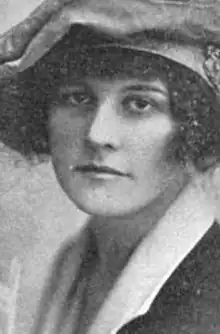May Christie | |
|---|---|
 May Christie, from a 1922 publication. | |
| Born | Elizabeth May Christie October 3, 1890 China |
| Died | February 16, 1946 Los Angeles, California |
| Nationality | British, American |
| Other names | May Christie Mazzavini (after second marriage) |
| Occupation | writer |
May Christie (October 3, 1890 – February 16, 1946) was a British-American writer and journalist, born in China to Scottish parents.
Early life
Elizabeth May Christie was born in China, the daughter of Dugald Christie and Elizabeth Hastie Smith. Her father was a medical missionary at Mukden (now Shenyang). She was raised in Scotland and attended the University of Edinburgh, where she earned a master's degree in English literature.[1]
Career
Christie's fiction included romance novels, short stories, and serials for magazines. Among her longform works were Helene's Married Life, The Marriage of Anne, (1920) Love's Gamble (1920), For Love of Betty (1921),[2] The Eternal Eve (1923), The Rebel Bride (1925),[3] The Gilded Rose (1925),[4][5] The Garden of Desire (1926),[6] Eager Love (1928),[7] Man Madness (1929), The Jazz Widow (1930),[8] A Kiss for Corinna (1930), Love's Miracle (1930),[9] Flirting Wives (1931),[10] Tomorrow Will Be Lovely (1936),[11] Women in Love (1938),[12] Honeymoon Preferred (1940), and That Man is Mine (1942).
In 1915 Christie was woman's page editor for the Philadelphia Evening Ledger. During World War I she became a London-based war correspondent for the McClure Newspaper Syndicate.[13][1] After the war, she carried Kaiser Wilhelm's typewritten memoirs to the United States for publication,[14] and wrote features for the New York Evening World.[1] She was admitted to the New York Newspaper Women's Club in 1922.[15]
Christie moved to California to write for the film industry. She wrote the English subtitles for an Italian film comedy, Amo te sola (I Love You Only, 1936).[12]
Personal life
May Christie married Alexander Elsden Martin, a captain in the British army, in 1920.[16] She married John Mazzavini, a stockbroker, in 1927. She died by suicide in 1946, aged 55, in Los Angeles, California.[17][18]
References
- 1 2 3 "New York Papers Are Wonderful, Says Feature Writer". The Fourth Estate: 10. 26 August 1922.
- ↑ "Advertisement". Star-Phoenix. 8 January 1921. p. 12. Retrieved 1 May 2019 – via Newspapers.com.
- ↑ Christie, May (1925). The Rebel Bride. Grosset & Dunlap.
- ↑ Christie, May (1925). The Gilded Rose. G.P. Putnam's Sons.
- ↑ "First American Novel by Clever May Christie". The Boston Globe. 29 August 1925. p. 5. Retrieved 1 May 2019 – via Newspapers.com.
- ↑ Christie, May (1926). The Garden of Desire. Grosset & Dunlap.
- ↑ "May Christie Writes New Novel for Morning News". The Morning News. 19 April 1928. p. 6. Retrieved 1 May 2019 – via Newspapers.com.
- ↑ Christie, May (1930). The Jazz Widow. Grosset & Dunlap.
- ↑ Catalog of Copyright Entries. New Series: 1930. Copyright Office, Library of Congress. 1931. pp. 555, 764, 1554.
May Christie.
- ↑ Christie, May (1931). Flirting Wives. Grosset & Dunlap Publishers.
- ↑ "'Tomorrow will be lovely' by May Christie | Hodder & Stoughton | V&A Search the Collections". V and A Collections. 1 May 2019. Retrieved 1 May 2019.
- 1 2 "An English Novelist in Hollywood". The Tatler. 147: 56. 12 January 1938 – via ProQuest.
- ↑ Christie, May (23 July 1916). "Through a Woman's Eyes: Serbia and the War". The Washington Herald. p. 7. Retrieved 1 May 2019 – via Newspapers.com.
- ↑ "Kaiser's Memoirs Brought to United States by Woman Writer" The Fourth Estate (August 19, 1922): 9.
- ↑ "Newspaper Women Have Own Club Rooms". The Fourth Estate: 26. 2 September 1922.
- ↑ "Authoress Plans to Live Romances on Honeymoon Trip Around the World". Boston Post. 29 August 1920. p. 42. Retrieved 1 May 2019 – via Newspapers.com.
- ↑ "May Christie si è uccisa". l'Unità. 19 February 1946. p. 1. Retrieved 1 May 2019 – via Internet Archive.
- ↑ "Triple Death Effort Proves Successful". The Los Angeles Times. 17 February 1946. p. 17. Retrieved 1 May 2019 – via Newspapers.com.
External links
- May Christie at IMDb
- A photograph of May Christie in the George Grantham Bain collection of the Library of Congress.